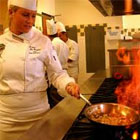I spent the five happiest years of my life in a morgue. As a forensic scientist in the Cleveland coroner’s office I analyzed gunshot residue on hands and clothing, hairs, fibers, paint, glass, DNA, blood and many other forms of trace evidence, as well as crime scenes. Now I'm a certified latent print examiner and CSI for a police department in Florida. I also write a series of forensic suspense novels, turning the day job into fiction. My books have been translated into six languages.
I”m sorry but I have no idea—you’d need a pathologist for that one.
That’s an excellent question, that unfortunately I can’t answer. We have the OBTI test that can confirm blood is human, but beyond that…I don’t know if there are alleles that both animals and humans share that might show up in the average DNA analysis. Even if animals have some alleles that are the same as humans, if those aren’t the alleles looked for in a DNA test, then it wouldn’t affect things. But if they are, then I don’t know if scientists have a way to distinguish them. Sorry I can’t be more help!
Could you clarify that question? I'm not sure what mean.
I’m not sure what you mean. Do you mean how does a forensic scientist advance in their career, or what scientific advancements have been made by forensic scientists?
3D Games Developer/Programmer
 Is the new Oculus Rift thing as cool as everyone says?
Is the new Oculus Rift thing as cool as everyone says?
Pharmacist
 Why is an advanced degree required to dole out pills at a pharmacy?
Why is an advanced degree required to dole out pills at a pharmacy?
Chef
 Do you get offended when a customer sends back a dish?
Do you get offended when a customer sends back a dish?
Job requirements depend on the job. Requirements might range from a HS diploma to a PhD. Check the websites of forensic professional organizations (IAI, AAFS, pathology or other disciplines) for job vacancies. I like the variability of the days.I dislike the hours, which can be unpredictable, and require being ‘on call.’
That would be a legal question, unaffected by forensics.
Unfortunately, no, I cannot. I've never worked in toxicology. Sorry I couldn't help.
-OR-
 Login with Facebook
Login with Facebook (max 20 characters - letters, numbers, and underscores only. Note that your username is private, and you have the option to choose an alias when asking questions or hosting a Q&A.)
(A valid e-mail address is required. Your e-mail will not be shared with anyone.)
(min 5 characters)
By checking this box, you acknowledge that you have read and agree to Jobstr.com’s Terms and Privacy Policy.
-OR-
 Register with Facebook
Register with Facebook(Don't worry: you'll be able to choose an alias when asking questions or hosting a Q&A.)